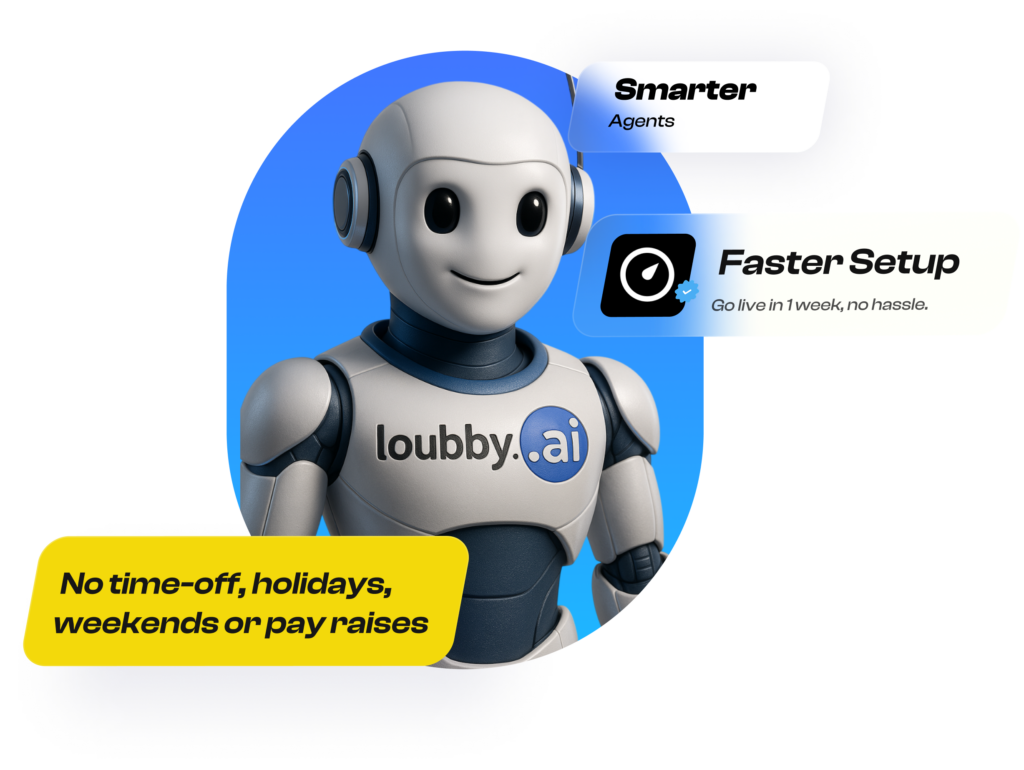Overview
Marketing managers are often buried under a pile of repetitive, time-sensitive tasks—campaign tracking, reporting, content approvals, and lead management—leaving little time for actual strategy or creative work. This case study explores how Loubby AI helped a growth-stage B2B SaaS company automate its marketing operations and enabled their marketing manager to execute campaigns 40% faster while reducing operational drag.
Company Background
The company, a New York-based SaaS firm in the martech space, had just raised its Series A and was preparing to scale its outbound campaigns across email, LinkedIn, and paid media. With only one marketing manager, supported by a designer and content writer, the team was struggling to keep up with coordination, tool-switching, reporting, and lead handoffs.
Despite using tools like HubSpot, Google Ads, Notion, and Asana, everything still required manual oversight. Reports were often delayed, campaigns missed alignment with sales, and high-priority leads were getting lost.
Challenges
- Manual lead tagging and CRM updates.
- Delays in syncing campaign data across platforms.
- Lack of real-time performance summaries.
- Too much time spent chasing approvals and status updates.
- Missed follow-ups on MQLs due to poor workflow triggers.
Why Loubby AI?
The company’s Head of Growth heard about Loubby AI during a webinar on no-code marketing automation. What caught their attention was Loubby’s ability to build AI-powered workflow agents customized to marketing operations—without the need for dev time or complex API setups.
Loubby AI proposed deploying an AI Marketing Operations Assistant that could:
- Sync and update campaign data across platforms.
- Automatically generate performance summaries.
- Route leads to sales in real time.
- Follow up with internal stakeholders on approvals.
- Create recurring reports for execs.
Implementation Timeline
Week 1: Discovery & Workflow Audit
Loubby’s onboarding team interviewed the marketing manager and growth lead to identify repetitive workflows and bottlenecks. They mapped:
- Weekly campaign tracking across Google Ads, LinkedIn, and email tools.
- Asana-based task dependencies and content sign-offs.
- Manual lead tagging in HubSpot.
- Slack reminders and handoffs to the sales team.
Week 2: Building the Marketing AI Employee
Loubby built a modular AI Marketing Assistant with four key agents:
- Campaign Sync Agent – Connected Google Ads, LinkedIn Ads, and email tools (like Mailchimp) to extract performance data.
- Summary Agent – Generated weekly campaign snapshots and sent them to stakeholders via Slack.
- Lead Router Agent – Detected new MQLs in HubSpot and sent them directly to the SDRs via Slack and calendar invites.
- Approval Tracker Agent – Monitored Asana and Notion boards for pending approvals and pinged stakeholders until completion.
The agents used Make.com for orchestration, integrated with HubSpot, Slack, Google Workspace, Notion, and Asana.
Week 3: Testing & Training
Loubby ran a closed loop test using a sample campaign. Over a 5-day window, the AI:
- Processed 3 ad channels.
- Generated 2 Slack-based campaign summaries.
- Routed 14 leads to SDRs within 3 minutes of MQL tagging.
- Followed up on 4 approval items.
The marketing manager was trained to override and edit any automated message and received training documentation for minor adjustments.
Week 4: Full Deployment
Loubby activated the AI Assistant and created a custom dashboard in Notion to give the manager real-time visibility into:
- Campaign metrics
- Approval status
- Weekly summaries
- Lead routing logs
All Slack messages were labeled with “[AI Assistant]” for clarity.
Results After 6 Weeks
- 40% faster campaign execution (measured by time to launch and post-mortem reporting).
- 35 hours/month saved on repetitive campaign ops tasks.
- 100% of MQLs routed in under 5 minutes, improving sales alignment.
- Zero missed approvals, thanks to persistent AI reminders.
- 25% increase in reporting accuracy due to real-time cross-platform sync.
Key Takeaways
- The AI Assistant didn’t replace the marketing team—it amplified their speed and reduced burnout.
- Loubby’s modular approach allowed for quick iteration without needing developer support.
- Workflow automation improved both internal communication and campaign output.
Client Testimonial
“This is like having a full-time ops coordinator on my team. I can finally focus on strategy and messaging instead of chasing data and tasks. It’s honestly one of the best marketing investments we’ve made.” — Marketing Manager, B2B SaaS Company (New York)
What’s Next
Following the success of the AI Marketing Assistant, the team is now building:
- A Social Media Content Scheduler Agent.
- An AI SEO Tracker for weekly rank monitoring.
- An Executive Reporting Agent to automate board-level summaries.
Loubby AI continues to support with quarterly automation planning sessions.
Conclusion
Marketing teams don’t need more tools—they need smarter workflows. Loubby AI’s Executive Assistants are changing how marketing ops gets done. With fast deployment, measurable ROI, and a no-code interface, any marketing manager can now operate like a team of five.Ready to deploy your own AI Assistant? Visit www.loubby.ai and get started in under a week.







